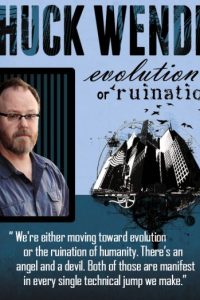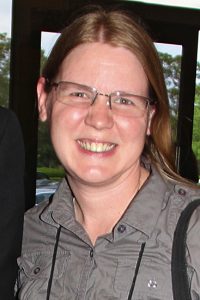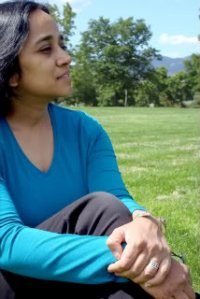John Joseph Adams: The Stars His Destination

John Joseph Adams was born July 31, 1976 and grew up in Perth Amboy NJ until moving to Florida at age nine. He dropped out of high school at 16, but got his GED and later attended Indian River Community College in Fort Pierce and then the University of Central Florida in Orlando. After graduation, he returned to New Jersey and got his first job in publishing. He began working at The Magazine of Fantasy & Science Fiction in 2001, where he was assistant editor until December 2009. In January 2010 he left F&SF to edit Lightspeed for publisher Prime Books, and took over editing sister magazine Fantasy in 2011. In 2012 he bought both magazines, becoming publisher as well, and merged the two into Lightspeed. He is also publisher and editor-in-chief of horror magazine Nightmare, founded in 2012. He has been nominated for multiple Hugo and World Fantasy Awards for editing, and Lightspeed won Hugo Awards for Best Semiprozine in 2014 and 2015.
In 2008 he edited post-apocalyptic reprint anthology Wastelands, and followed it up with zombie anthology The Living Dead (2008). His first original anthology was Seeds of Change (2008), and he has since edited more than two dozen anthologies all together, including the Apocalypse Triptych series with Hugh Howey: The End Is Nigh (2014), The End Is Now (2014), and The End Has Come (2015). He is also the series editor for The Best American Science Fiction and Fantasy, which published its second volume last year.
In 2016 he launched John Joseph Adams Books, his own imprint from Houghton Mifflin Harcourt, and has since acquired books by Hugh Howey, Molly Tanzer, Carrie Vaughn, and more.
Adams has also worked as a publicist and critic, and produces podcast The Geek’s Guide to the Galaxy for Wired.com. In 2015 he was a judge for the National Book Award in the YA category. He lives on the Central Coast of California with his wife, editor and author Christie Yant, married 2011.
Excerpts from the interview:
‘‘Things took a more dramatic turn for me when I stumbled across The Stars My Destination by Alfred Bester. It had just come back into print after being out of print for a long time, and people kept coming into the bookstore and ordering it, so I got curious about it. I didn’t know Bester was a legend in the field. Neil Gaiman wrote the introduction, but at the time I didn’t know who he was, either. I just decided to try it…and it just blew my mind. I think of The Stars My Destination as my origin story: reading that book made me want to find more books that could blow my mind like that. Having read The Stars My Destination, I went on a quest to find more books like it, and ultimately that’s what led to me becoming an editor – to driving myself to find things that would challenge me as a reader and change the way I read. Before that, I’d pick up a book, and I’d like it or I wouldn’t, but I wasn’t striving to find that greatness.”
…
‘‘I was at F&SF about nine years. I was the slush reader, the only actual employee in the office day-to-day besides Gordon, working 20 hours a week or so. I would read all the slush except for whatever Gordon would cherry-pick. Obviously authors who were known quantities, he would pick them out of the slush to read himself, along with the occasional up-and-comers he wanted to keep an eye on. As time went on, I became more and more sure as an editor and felt more confident in my decisions. Though my primary job was slush reader, Gordon also started giving me everything he was going to buy to get a second opinion on those stories. So I literally read everything he bought before he bought it for most of my time at the magazine. That really helped me develop my editorial point of view because I got to read and comment on all of the stories under consideration – not just the stuff that got into the magazine but also the stuff that almost got into the magazine.”
…
‘‘Night Shade was very happy with Wastelands. Then they came to me and said, ‘Let’s do one on zombies.’ Unlike post-apocalyptic fiction, I didn’t have any background with zombies whatsoever. I hadn’t done any research. But I said, ‘Sure!’ So I did tons of zombie reading and research, assembled The Living Dead, and when it came out and did even better than Wastelands. Having those two books come out my first year as an anthologist – and having them do so well – really set the stage for me to keep editing anthologies.”
…
‘‘We launched Lightspeed in June 2010. Prime Books published it for about a year and a half, but then Sean Wallace decided to get out of the magazine business, and gave me the opportunity to buy it in lieu of him just shutting it down. By that time I’d taken over editing Fantasy as well. Lightspeed was breaking even and Fantasy was not, but since Sean was offering them both I decided to buy them both. With the success of my anthologies, I was in good enough financial position to buy them, but it was a difficult decision because it also meant I would have to do a lot more work day-to-day, because now I would be the publisher as well. But I went ahead and took the plunge.”
…
‘‘Though it sometimes makes things more difficult, I ended up doing the same thing when I launched the Best American Science Fiction and Fantasy series, in that I said right up front that it was my intention to have fantasy and science fiction equally represented in each volume. Even though I don’t particularly care about the genre divisions, I want them to have equal representation, since both genres are in the title.
…
‘‘The way BASFF works is, as series editor I read everything that’s published during the year that meets our selection criteria, and I come up with a list of the top 80 stories. We bring on a different guest editor every year who then reads those top 80 stories and selects the top 20 that go into the book. Our first guest editor was Joe Hill, and then the second volume was guest edited by Karen Joy Fowler. I give the stories to the guest editor without any bylines or publication information, so all they know is the title and the story; they can’t pick a story because it’s by a famous writer, or look favorably upon it because it appeared in a prestigious magazine – all they have to judge it on is the work itself, and that’s kind of a beautiful way to edit an anthology.”
…
‘‘I’ve always been a fairly fast reader, but lately I’ve had to really try to pick up my game. The good thing is, you can dismiss a lot of novels in the time it takes to dismiss a short story – because a lot of books, as soon as you start them you just know really quickly it’s not for you, that you don’t want to spend hours and hours reading it, let alone weeks editing it. With John Joseph Adams Books, I’m trying to apply the same kind of filter I do for BASFF – I only have ten slots a year, max, so I really have to be in love with every book I acquire.”
Read the complete interview in the March 2017 issue of Locus Magazine. Interview design by Francesca Myman, John Joseph Adams photo by Liza Groen Trombie.





